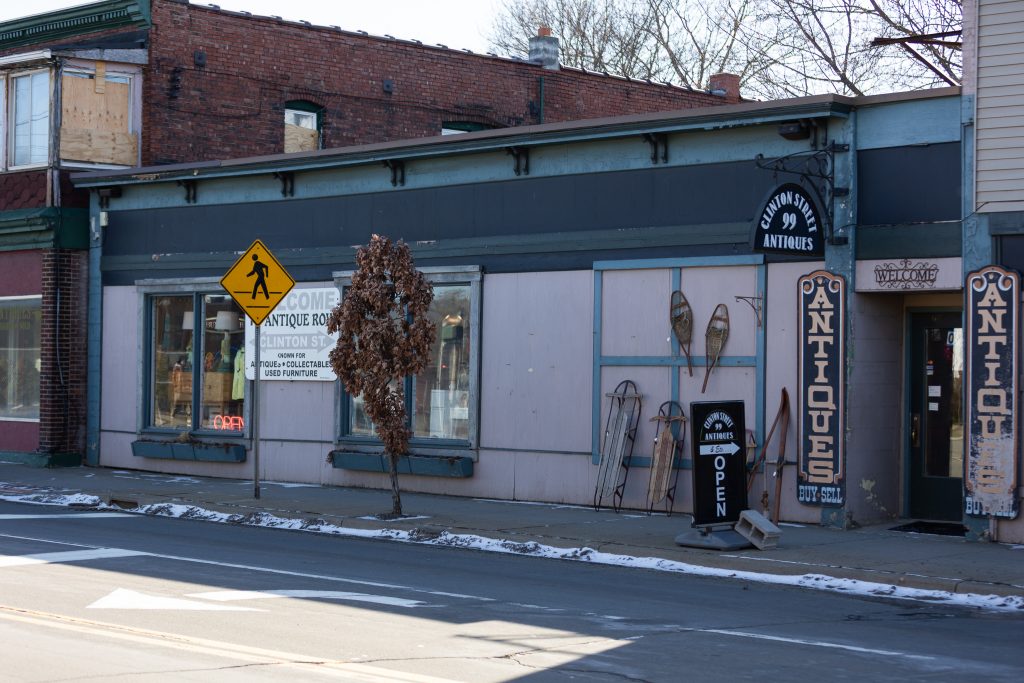The city of Binghamton has won $10 million from a state program that aims to transform downtowns into vibrant city centers, Gov. Kathy Hochul and Mayor Jared Kraham announced on Thursday.
The program, the Downtown Revitalization Initiative, is administered by the Department of State in collaboration with Empire State Development, New York State Homes and Community Renewal and the Energy Research and Development Authority.
Binghamton’s application for the initiative’s eighth round centered around historic Clinton Street in the city’s First Ward. Kraham, in a letter to the Southern Tier Regional Economic Development Council, said that the area’s “historic storefronts, walkable footprint, development ready spaces and proximity to Binghamton’s urban core make it ready-built as the next great downtown in Upstate New York.”
“The plan is an ambitious but achievable set of projects — new housing, mixed-use storefronts, streetscape enhancements, public art, facade improvements — that all tap into the potential of Clinton Street and support families and small businesses,” Kraham wrote, announcing the award. “Our work on this took years, part of my commitment to the First Ward and rebuilding our neighborhood business districts.”
He said the area’s proximity to Binghamton University, UHS Wilson Medical Center, UHS Binghamton General Hospital and Downtown Binghamton primed it for mixed-use development, with an array of businesses at the ground level and residential housing above.
“By investing in the future of these Southern Tier communities, this funding will revitalize their downtown areas by building vibrant and thriving destinations where businesses, families and visitors can flourish,” Hochul said in a press release.
“With our Pro-Housing Communities initiative, we’re giving local leaders the tools to transform their cities, towns and villages into hubs of opportunity, culture and affordable living,” she continued. “This is how we build stronger, more connected communities that work for everyone across New York.”
Neighboring Johnson City won the $10 million award in February 2023 to rejuvenate its downtown. Only localities certified by the state as “Pro-Housing Communities” are currently eligible, a designation Hochul created that July to “recognize and reward municipalities actively working to unlock their housing potential.” Both Binghamton and Johnson City won this designation in February 2024.
The city’s application emphasized the area’s unique character, including being the home of Antique Row, a cluster of longstanding antique and vintage stores. The proposal included a list of ongoing developments, including a project at a vacant 3.9-acre lot at 187 Clinton St. that he announced in September 2023.
Attached to the outline of development initiatives were letters of support from several community organizations and local leaders. These included the Boys and Girls Club of Binghamton, the First Ward Action Council and the mayors of Johnson City and Endicott.
Binghamton’s successful application was celebrated by State Senator Lea Webb ‘04 and Assemblywoman Donna Lupardo MA ‘84.
“These state initiatives provide critical funding to support the revitalization and growth of downtowns small and large across New York,” Webb said in the release. “I am excited to see the full potential of the Clinton Street Corridor unlocked with this funding so that it can continue its growth as a vibrant neighborhood, attracting more businesses, residents and visitors to Binghamton’s First Ward.”
Hochul’s announcement also named the villages of Bath and Dryden as the recipients of two $4.5 million awards for downtown development through NY Forward, a program created to revitalize smaller and rural communities.
To be considered for the Downtown Revitalization Initiative, municipalities submit applications to Regional Economic Development Councils representing each of the state’s 10 recognized regions. With their selections, Binghamton, Bath and Dryden will now create a strategic investment plan with local planning committees composed of local stakeholders and supported by private-sector leaders and state planners.
“Clinton Street’s time is now,” Kraham wrote. “We can’t wait to get started and put into motion the projects and revitalization efforts that residents deserve.”



